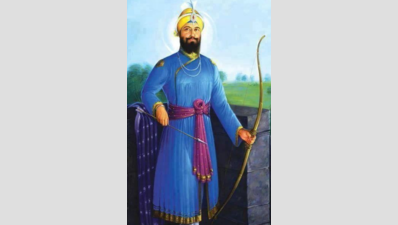- News
- City News
- patna News
- ‘Guru Gobind Singh always fought for the poor’
Trending
This story is from September 23, 2016
‘Guru Gobind Singh always fought for the poor’
“Tum bhi praja thae ho, Shudra jinhe batate ho. Din bandhu tabhe sadheo, dinan raj bhogeho. (You will be ruled by those whom you call Shudras today. I will be remembered as Din bandhu only when power is transferred to them)."

(Representative image)
PATNA: “Tum bhi praja thae ho, Shudra jinhe batate ho. Din bandhu tabhe sadheo, dinan raj bhogeho. (You will be ruled by those whom you call Shudras today. I will be remembered as Din bandhu only when power is transferred to them),” Punjabi University, Patiala, vice-chancellor Jaspal Singh quoted the 10th Sikh guru, Guru Gobind Singh, telling the kings who had refused to join his battle against the Mughals because his army consisted of ‘Shudras’ (people from low castes).
Chairing the session on ‘Guru Gobind Singh: Spiritual Saviour and A Crusader of Rights’, on the second day of International Sikh Conclave here on Friday, the VC said Guruji was a saint who accepted the challenge and took up ‘shastra’ (arms) when the time demanded. “When people were suffering under the Mughal rulers, Guruji vowed to instill confidence and a fighting spirit in them and valiantly won all the battles he fought in the late 17th and early 18th centuries,” he said, adding that many historians claimed there was no other army general like him who relied upon the weakest to fight the strongest.
A galaxy of national and international scholars presented their papers on the topic.
Lt Gen (retd) K S Gill, who has studied the battles fought by Guruji, said he trained his army at ‘Panonta Sahib’, which is about 50km from Dehradun where the Indian Military Academy is situated. “It is not a mere coincidence. The place selected by him was apt for military training,” he said.
Professor Harbans Kaur Saddhu, the director of International Centre for Sikh Studies, said Guruji combined ‘bhakti‘ and ‘shakti’. “Had Guruji not done so and fought wars against conversion, it would have been the world of monolithic religion,” she said quoting Sufi saint Bulleh Shah.
Talking about Guruji’s spirituality, Sukhbir Singh of UK-based Guru Nanak Nishkaam Sewak Jatha said he never favoured anyone going to forest for attaining spirituality. “He asked his faithfuls to consider their homes as forest and practise detachment from lust and anger. Eating and sleeping less, forgiveness and fighting for the cause of others were the hallmarks of spirituality for him,” Sukhbir said.
Mohd Habib of Punjabi University, Patiala, sought to dispel the myth that a common Muslim during the Mughal period was against Guruji. “The more we beg pardon for this chapter in history, the lesser it would be. However, it should be clear that a common Muslim never supported those rulers because they never practised the principles of equality and love on which the Islamic polity is based,” he said.
Chairing the session on ‘Guru Gobind Singh: Spiritual Saviour and A Crusader of Rights’, on the second day of International Sikh Conclave here on Friday, the VC said Guruji was a saint who accepted the challenge and took up ‘shastra’ (arms) when the time demanded. “When people were suffering under the Mughal rulers, Guruji vowed to instill confidence and a fighting spirit in them and valiantly won all the battles he fought in the late 17th and early 18th centuries,” he said, adding that many historians claimed there was no other army general like him who relied upon the weakest to fight the strongest.
A galaxy of national and international scholars presented their papers on the topic.
Lt Gen (retd) K S Gill, who has studied the battles fought by Guruji, said he trained his army at ‘Panonta Sahib’, which is about 50km from Dehradun where the Indian Military Academy is situated. “It is not a mere coincidence. The place selected by him was apt for military training,” he said.
Speakers quoted the fact that Guruji selected three Dalits among the ‘panj pyaras’ for creating the ‘Khalsa’ panth. The poor and the downtrodden were always in the back of his mind during all the battles he fought. “Manas ki jaat ek hi pehchanbo” was his mantra for life. However, for these principles, Guruji had to pay a heavy price. While his two younger sons were bricked up alive for not embracing Islam, the other two were martyred in battlefield. His father and the ninth guru sacrificed his life for the cause of Kashmiri Pandits and, therefore, he is referred as ‘Sarbans Dani’, many speakers said.
Professor Harbans Kaur Saddhu, the director of International Centre for Sikh Studies, said Guruji combined ‘bhakti‘ and ‘shakti’. “Had Guruji not done so and fought wars against conversion, it would have been the world of monolithic religion,” she said quoting Sufi saint Bulleh Shah.
Talking about Guruji’s spirituality, Sukhbir Singh of UK-based Guru Nanak Nishkaam Sewak Jatha said he never favoured anyone going to forest for attaining spirituality. “He asked his faithfuls to consider their homes as forest and practise detachment from lust and anger. Eating and sleeping less, forgiveness and fighting for the cause of others were the hallmarks of spirituality for him,” Sukhbir said.
Mohd Habib of Punjabi University, Patiala, sought to dispel the myth that a common Muslim during the Mughal period was against Guruji. “The more we beg pardon for this chapter in history, the lesser it would be. However, it should be clear that a common Muslim never supported those rulers because they never practised the principles of equality and love on which the Islamic polity is based,” he said.
End of Article
FOLLOW US ON SOCIAL MEDIA










